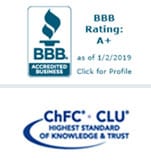It’s spring; the ground is thawing, the birds are singing and, if you’re like us, you’ve already started to eye the vacuum and the mop. We get it–you’ve got spring cleaning on your mind. But what about your finances? Keep reading for five ways to clean up your financial future before June.
1. Dust Off Your Budget
If you haven’t revamped your budget since last year, it’s time to take it down off the shelf and blow off some cobwebs. Regular budget inspections are one of the best ways to monitor your spending and prevent unpleasant surprises. To inspect your budget, you will need your credit card bills from the last six months as well as three highlighters in different colors. In one color, highlight necessary expenses such as rent, utilities, and groceries. In another color, highlight purchases that are non-necessary but highly useful or desirable like your Netflix subscription or a new microwave. Use the third color to highlight less thoughtful purchases like your daily soy macchiato from Starbucks or that gym membership you haven’t used since January 2016. Focus on that third color when looking for expenses to eliminate from your budget.
2. Brush Up on Your Goals
Sit down with your spouse and/or your financial advisor to talk about your goals for retirement. Make sure everyone is on the same page about where your finances are now, and where they’re going next year as well as next decade. The fear of running out of money during retirement is as common as it is understandable: according to the Government Accountability Office’s 2013 Retirement Security Survey, only 48% of Americans over the age of 55 have both a retirement plan and savings. Feeling anxious about your financial future? Cowen Tax Advisory Group offers free consultations to help get you on track for a financially secure retirement.
3. Rake in Retirement Contributions
We know—you haven’t had to do any actual raking since November, but if you contribute to your IRA before April 17th, 2018, you will be able to make a corresponding deduction on your 2017 taxes. People under 50 can contribute up to $5,500 annually, but if you’re over fifty, you can take advantage of catch-up contributions and pay in as much as $6,500. Remember: the sooner you put money into a retirement account, the longer—and larger—your earnings will grow.
4. Clean Up Your Beneficiary Forms
Life insurance policies, bank accounts, brokerage accounts, and retirement plans typically have beneficiary forms that will override your will. Make sure to update all beneficiary forms after major life changes such as marriages, divorces, deaths, or births. It’s also a good idea to review them annually to make sure they are current.
5. Take Out the Trash
Clean up your house and your finances at the same time by getting rid of some those old financial documents you might have floating around. Two basic rules to help you cut down on the clutter: hold onto paystubs and bank statements for a year, and keep tax documents for seven years. Still unsure? Here’s a complete list of documents and how long you should save them, courtesy of the Better Business Bureau. And don’t forget to shred documents containing account numbers, birth dates, passwords, PINS, signatures and Social Security numbers.
Edited by:


Sara McKinney
saractag@gmail.com
Sara is a recent graduate of Kalamazoo College and a new addition to the Cowen Team. Her responsibilities include IT support, event planning, and general administrative assistance.




